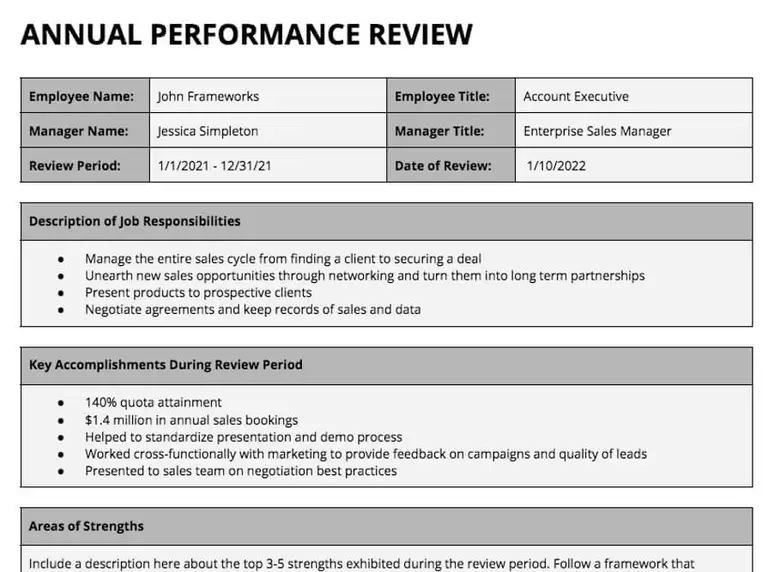Most employees would probably love the idea of their employer considering alternatives to performance reviews. The majority of today's top employers realize that annual performance reviews very often actually achieve the opposite of the original goal by demotivating your staff and negatively affecting productivity.
But are there viable alternatives to performance reviews and if so, what are they? Why do performance reviews at all? Has the time for renaming performance management to something more appropriate perhaps arrived? How should a business decide what to replace performance reviews with?
Alternatives to performance reviews
Let's take a closer look at what some of the most progressive companies out there are doing to replace the annual review with an alternative approach.
#1 Shift your focus to goals and accomplishments
Rather than rating your staff members according to a list of subjective criteria that are difficult to apply fairly, rather train your managers to think in terms of setting smart real-world goals for their workers and then regularly discuss with them how well they are achieving these goals and where things could improve.
This will enable managers to objectively measure staff members' activities in terms of measurable goals and objectives. It will also help to keep the workforce focused on specific goals throughout the whole year. And finally, it provides an opportunity to discuss deviations from these goals in a non-threatening manner.

#2 Conversations around career development
These conversations help both managers and their team members to stay focused on the future. They also provide managers with an opportunity to discuss a worker's strong and weak points with him or her in a relaxed environment.
The aim here is career development, not reproachment. During such conversations, it could, for example, become clear that the employee has skills that could be refined with further training. That way, the annual performance appraisal can create a culture of feedback rather than become something to be feared.
#3 Have regular one-on-one meetings
These types of regular check-ins help to establish a bond of respect and trust between workers and managers.
Because they are informal, they provide the perfect opportunity for the latter to provide performance coaching, point out possible obstacles, and thank staff members for their hard work. Instead of an annual review, you can provide and receive frequent feedback to your team.
If these one-on-one meetings are held regularly, they make it much easier for managers to evaluate performance. That means mistakes and counter-productive work habits can be eliminated before they become habitual, fostering professional growth.
Apart from that, regular one-on-one meetings provide an opportunity to show workers that the company cares about their performance and experience. A one-on-one meeting is also a great opportunity for managers to listen to what their workers have to say.
It has been shown over and over again that engaged workers are better motivated and more productive. And if you take a more informal approach to employee feedback, everyone in your team will be better of.
#4 More frequent and less formal reviews
Another alternative to performance reviews on an annual basis is to simply make these reviews more frequent, for example, quarterly, monthly, or weekly. Quarterly checks, in particular, are a great alternative. While it's still not real-time feedback, it's a step in the right direction.
These 3-monthly meetings can be either informal or formal. The aim here is to objectively discuss the previous quarter's performance and then shift the focus to the next quarter and future performance.
Quarterly check-ins also help to foster a relationship of trust between manager and worker, with faster feedback and more 2-way interaction. Apart from that, the manager's preparation for quarterly reviews will be less than usual because of the shorter period involved.
Quarterly checks are a great supplement to your one-on-ones in a traditional performance review.
These meetings can be formal or informal. The goal is to discuss performance from the previous quarter and then look ahead to the next quarter. Having a check-in every three months helps to promote a relationship of trust with more interaction, faster feedback, and quicker response.
#5 Separate reward from feedback
To remove the element of dread from performance reviews, a good idea is to draw a clear distinction between reward and feedback.
Rather tie promotions, bonuses, and pay increases to measurable data and accomplishments. One option is to award smaller but more frequent bonuses and to make sure that the timing of these does not coincide with employee reviews.
Ongoing feedback ensures that employees don't think about peer feedback as a way to get promoted or punished. Have conversations about performance more often and make sure the annual review does not coincide with promotions.
#6 Where possible, link feedback to specific projects
Per-project feedback enables managers to assess employees' performance in a more relevant and timely manner. While a yearly performance review concentrates on a vast number of different projects throughout the year, feedback after every project has a much more specific focus.
Project-based feedback, therefore, ensures that the details will still be fresh in that particular staff member's mind, which makes it much more useful when trying to learn from both successes and failures. Employee performance issues can be fixed instantly.
Employees will also be better prepared for their next project because their goals will be specific instead of general like before. And with regular insights, managers will be in a much better position to provide both recognition for work well done and advice for future projects.
#7 Make feedback more casual and less formal
Managers should be trained to regard a review as a chance to coach a particular employee instead of an opportunity to reward and/or criticize him or her. In other words, feedback should concentrate on the opportunities the future holds instead of the mistakes of the past.
Annual appraisals often appear to employees as discussions about job performance that focus on the negatives alone. Make the performance conversations less formal and aim to give constructive feedback instead of just pointing fingers at poor performance.
#8 Broaden the input of the evaluation process
When it comes to nontraditional performance reviews, this one stands out from the crowd. It involves including an employee's peers when the time arrives to evaluate his or her performance. If done constructively and with the aim not to destroy but to build, it can be a great tool to boost morale and build team spirit.
Another option is to also give workers a chance to review the review process. This will enable the firm to get an honest appraisal from workers about how they experience the process and provide management with an opportunity to make the necessary adjustments.
#9 Use ongoing two-way feedback
If you want your organization to grow, this is not an option but a must because it allows both managers and workers to request feedback. It makes workers understand that their opinions are important to the firm and gives bosses crucial insights into how they can grow as leaders and enhance their workers' experience.
Plus, when it works both ways, workers will much more readily accept feedback than when it's a top-down system. Regular feedback helps everyone with employee development.
#10 Alternative performance appraisal methods
To managers from the baby boomer generation, this might sound like blasphemy - but there are various high-tech alternatives to performance reviews available in the form of digital review platforms and apps.
These provide opportunities for both workers and managers to give live feedback to each other. Some of them even have an option that makes employees' feedback visible to their fellow workers. That way, even negative feedback can be applied in a good, constructive way.
Wrapping up
The traditional annual performance review is clunky and outdated. Modern companies should strive to provide continuous feedback instead of waiting for a year to have performance discussions. Today, we've given you the best alternatives you can try and give more timely feedback to your employees and peers.
And if you're looking for a way to do performance ratings and improve the feedback process with ease, simply try time tracking. By using Unrubble to track your time, you'll be able to see who the poor performers are and what processes, tasks or people are holding you back from your business goals.

![How To Evaluate HR Transformation Effectiveness [2026 Guide]](/static/image?src=https%3A%2F%2Fcdnblog.unrubble.com%2Fpayload-unrubble-images%2FUnrubble-how-to-evaluate-hr-transformation-effectiveness-2026-guide-180x120.jpg&width=128&height=128&fit=cover&position=center&quality=65&compressionLevel=9&loop=0&delay=100&crop=null&contentType=image%2Fwebp)






